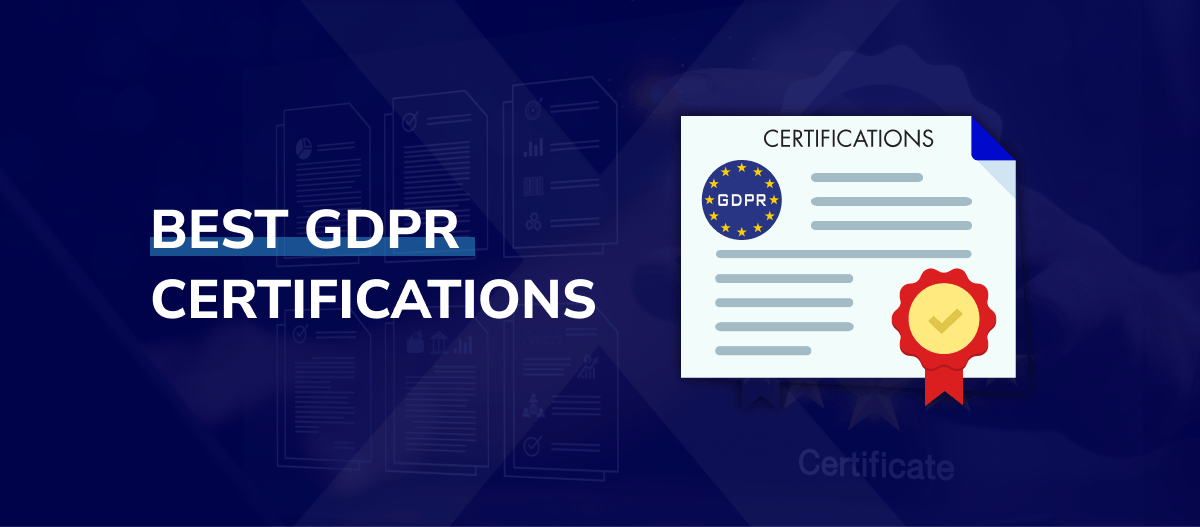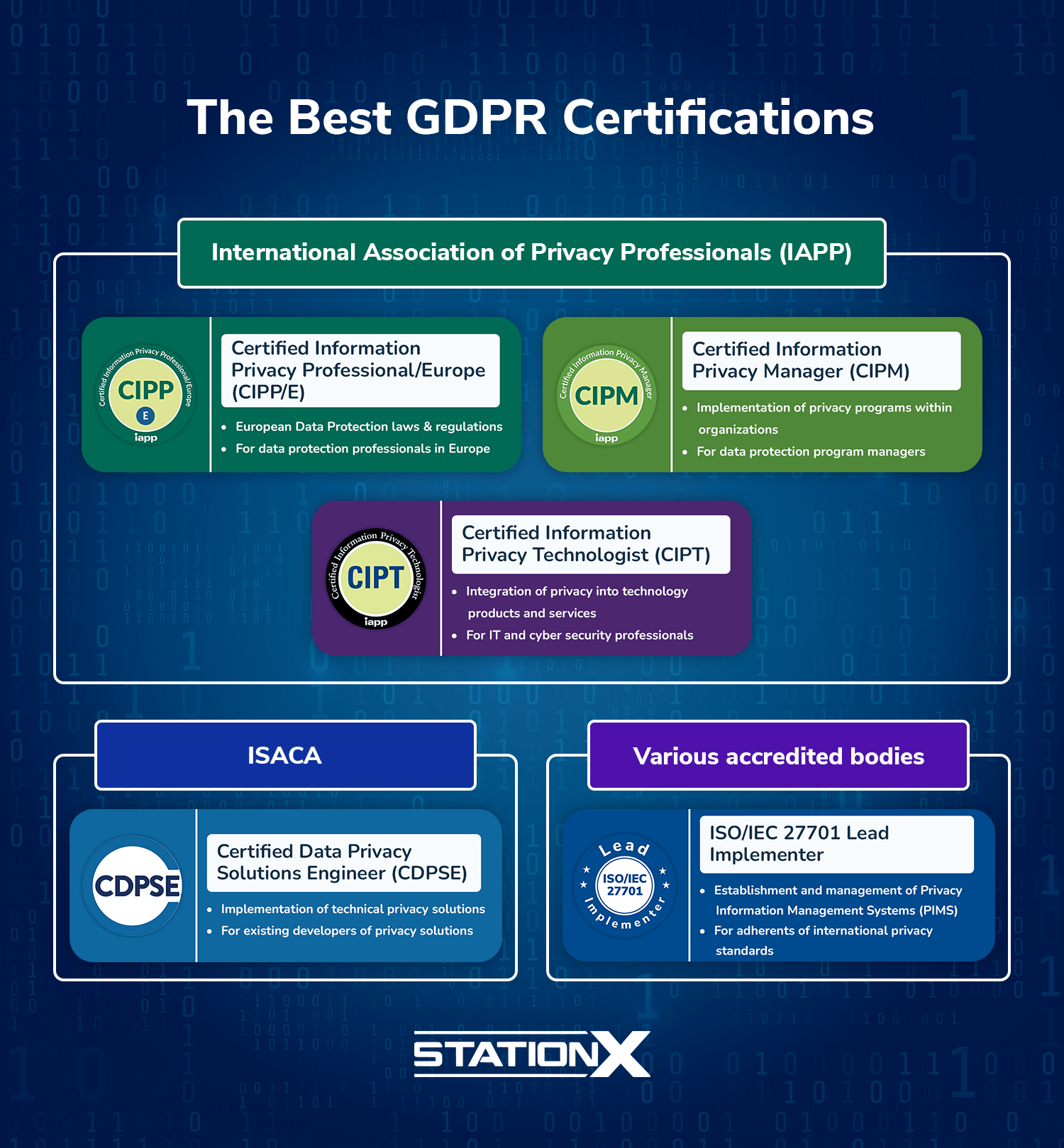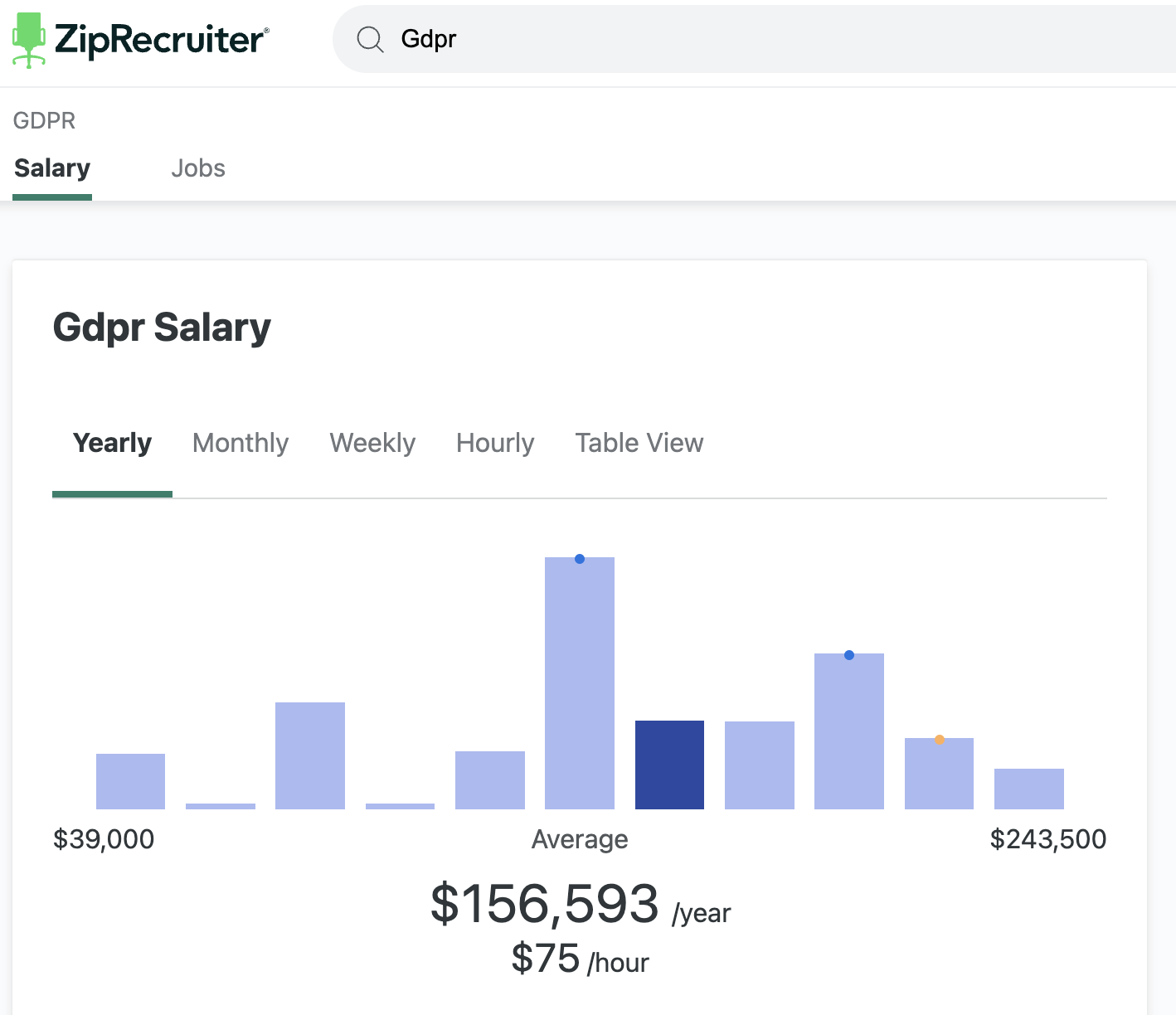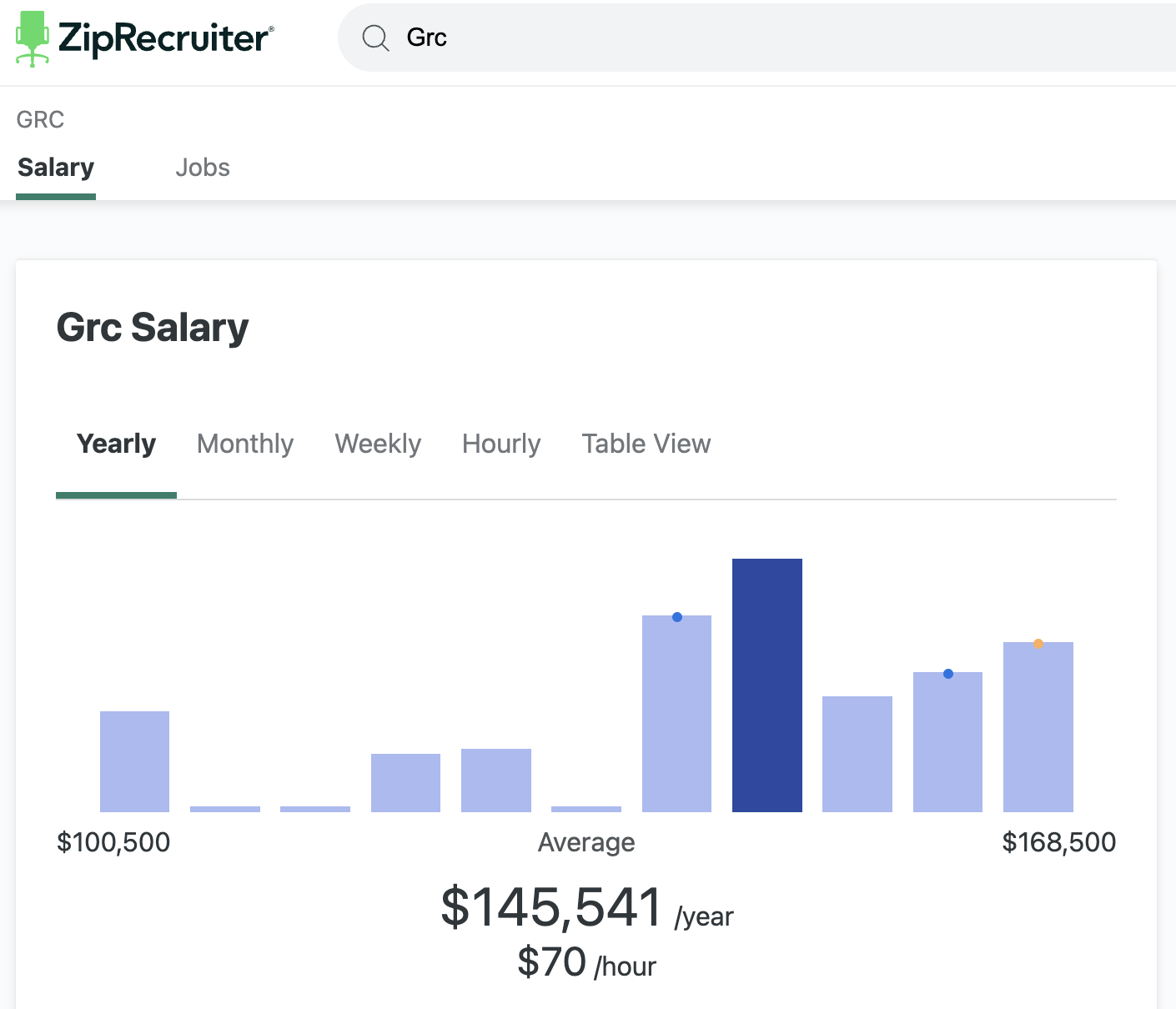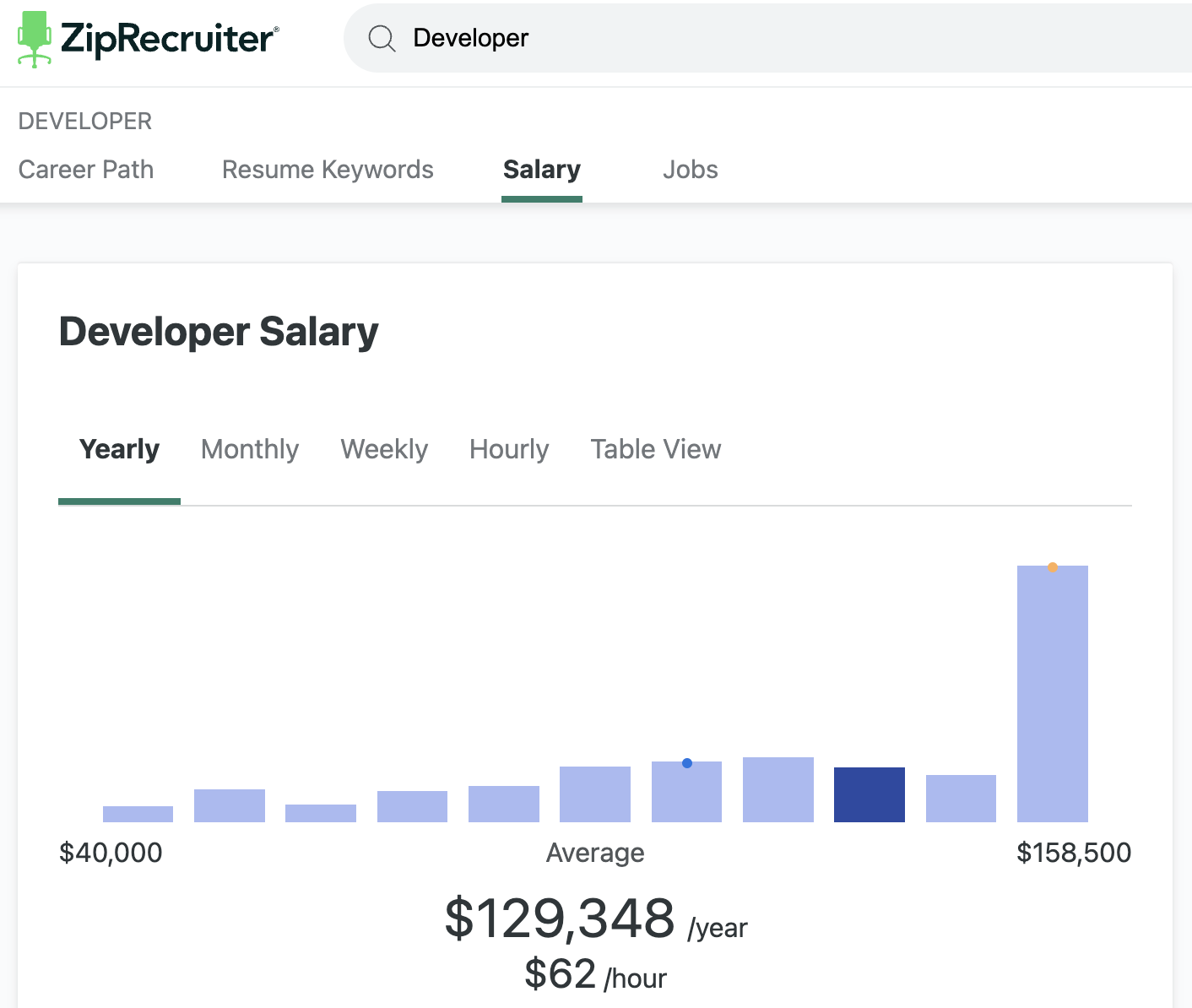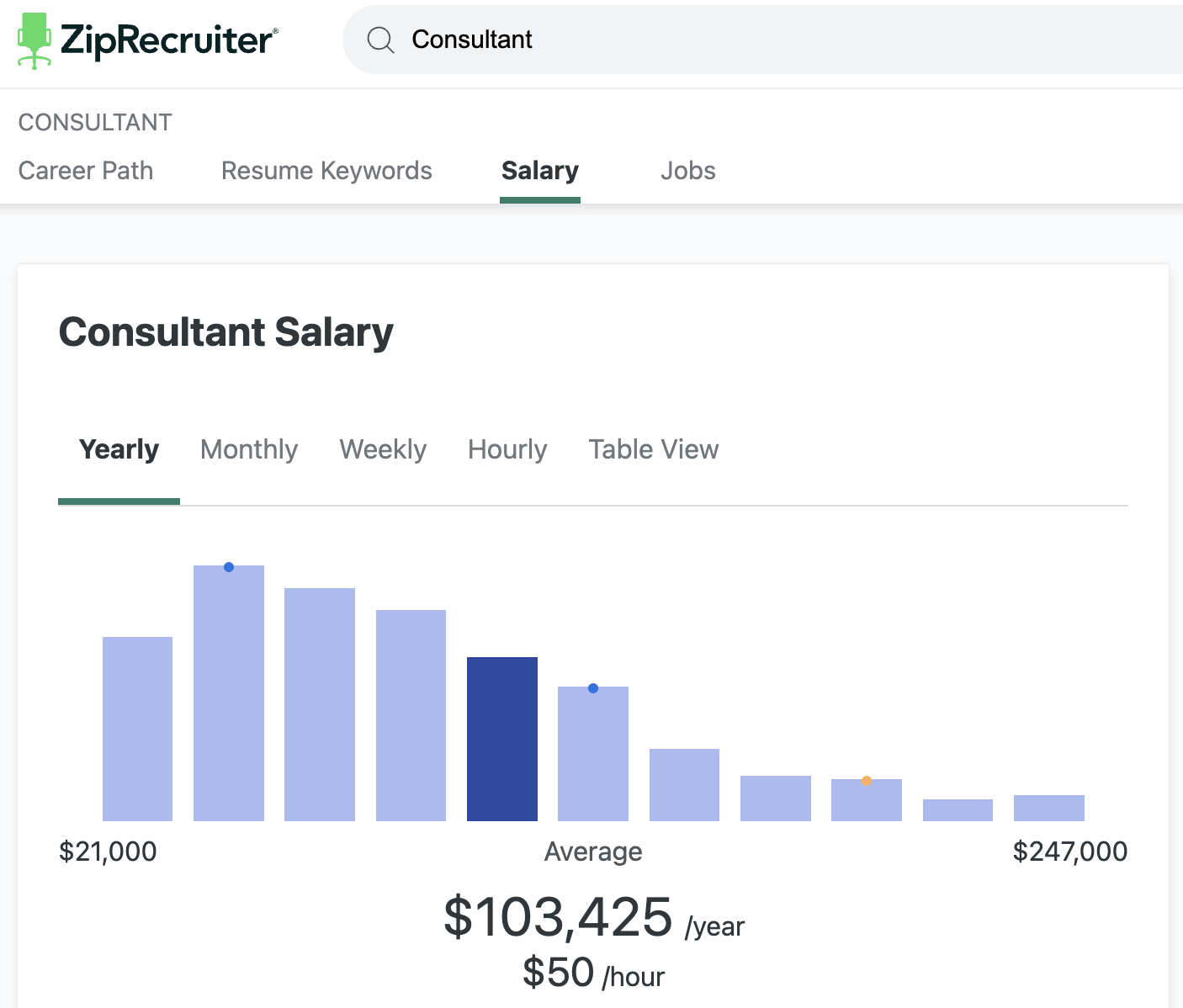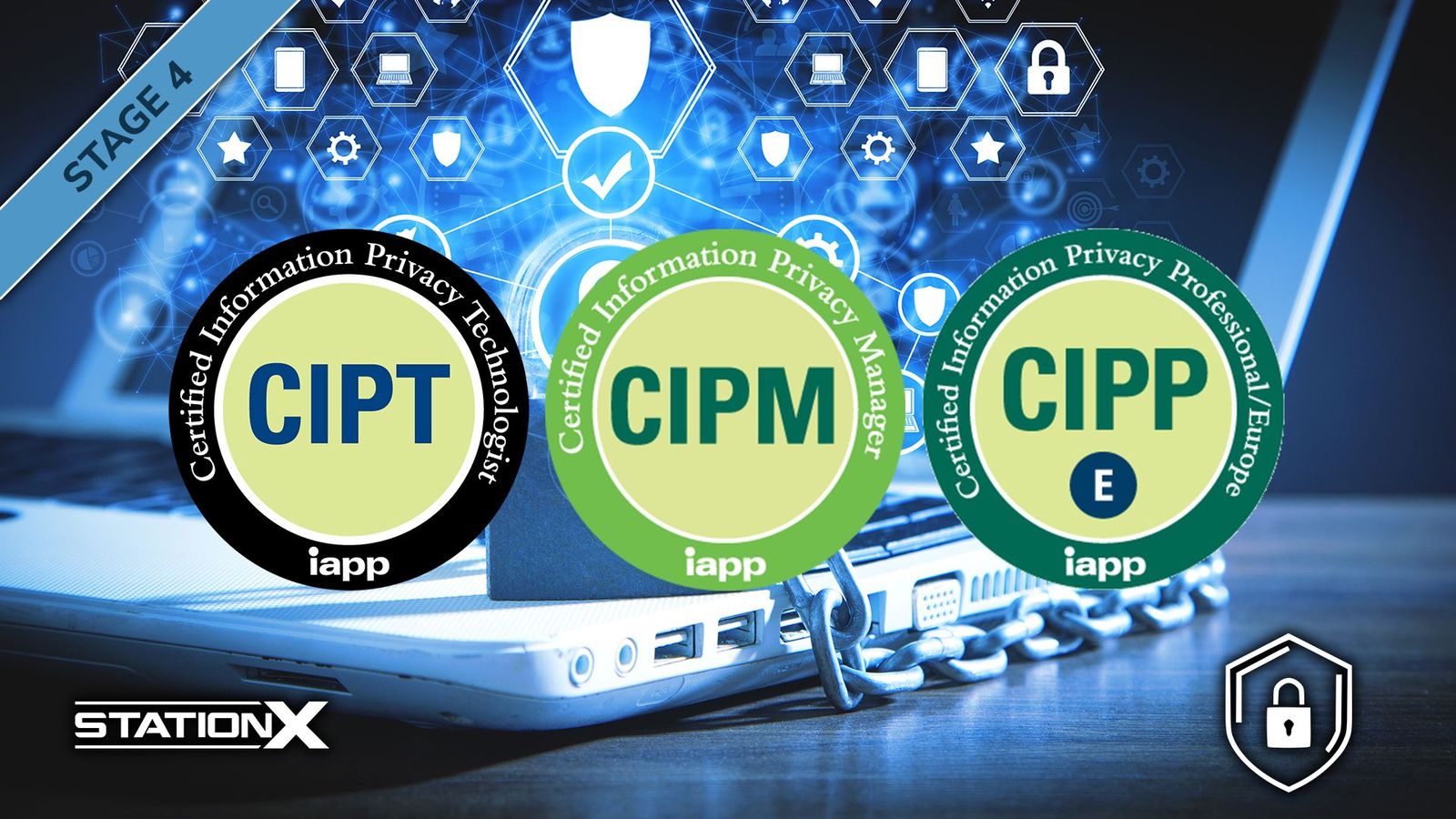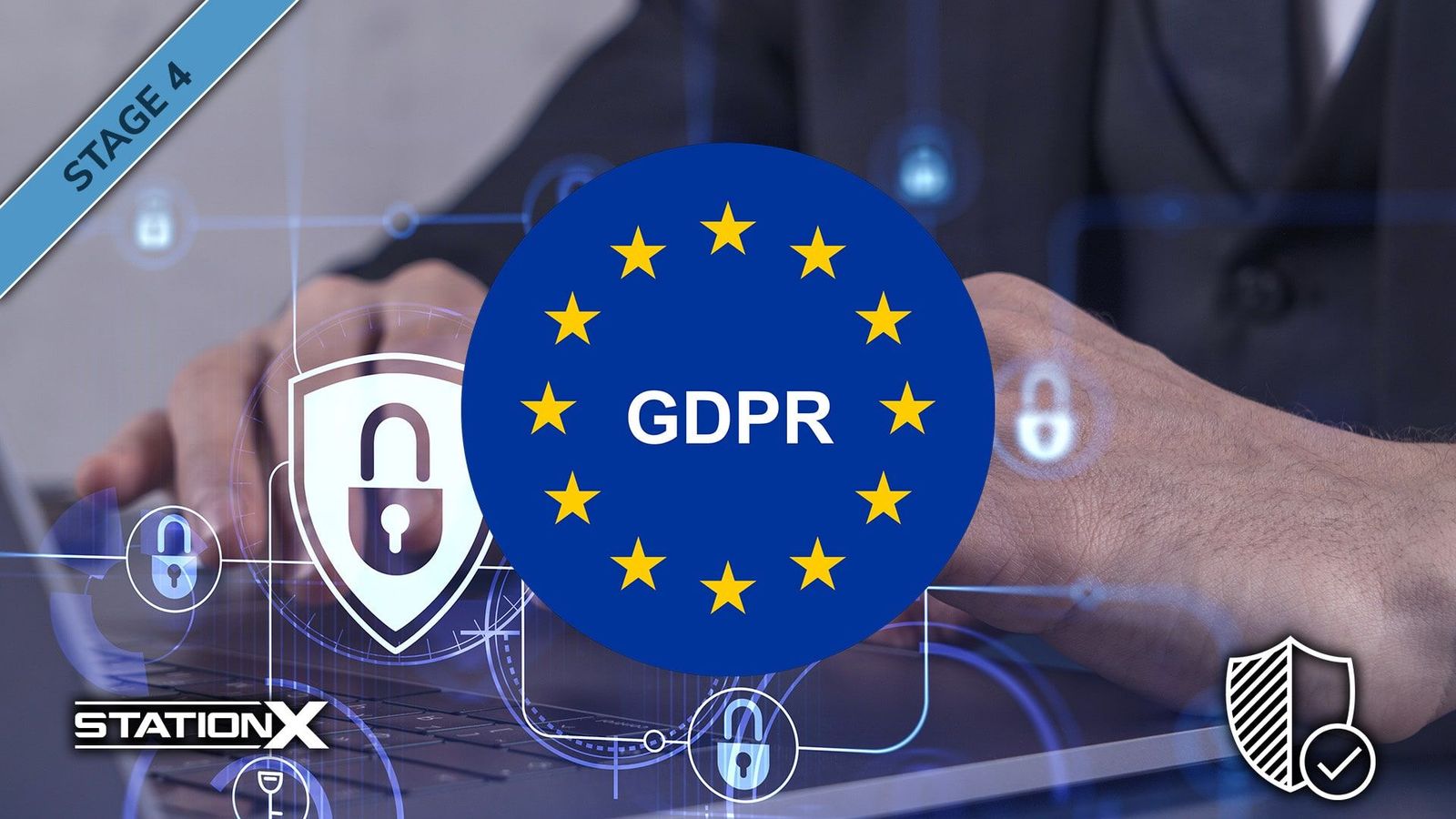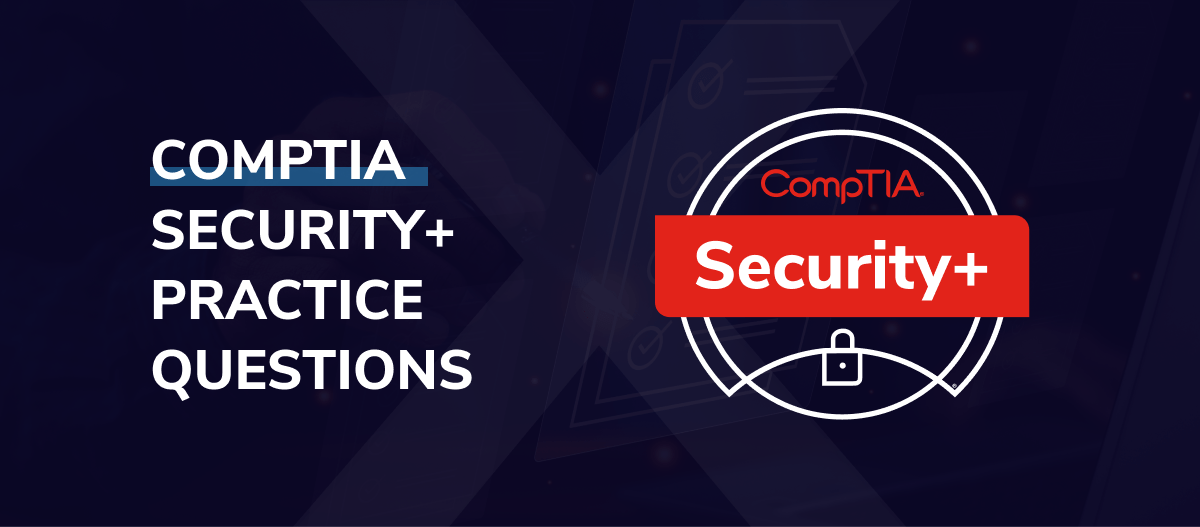Thanks to those ever-present website cookie banners, you’ve likely encountered the General Data Protection Regulation (GDPR) more times than you can count. You might also have noticed GDPR certifications popping up frequently in job listings—especially for IT, legal, or advisory roles.
Still, if data governance and protection aren’t exactly your area of expertise, you may be unsure where to find the best GDPR certifications to stay competitive in your field. Maybe you’re even feeling the pressure to get GDPR-certified now but don’t know where—or how—to begin. The good news? You’re in the right place.
Fear not: we’ve done the essential research for you. In this article, we’ll walk you through the best GDPR certifications available, how to choose the one that aligns with your career goals, and how to prepare effectively. You’ll be ready to meet this de facto job requirement, tackle GDPR-related interview questions, and contribute to protecting data privacy and security.
Without further ado, let’s dive in.
Understanding GDPR
Since the 2000s, many people have entrusted web services with their data. Despite this, data breaches have also become an everyday occurrence, and every country’s scramble to resolve such data crises often conflicts with neighboring nations.
However, many European countries decided to have a unified legal response against data privacy and security threats. Drafted and passed by the European Union (EU), the General Data Protection Regulation (GDPR) has been in force since May 25, 2018.
Any organization that targets or collects data related to people in the EU is subject to these data protection rules. The key principles of the GDPR are:
- Lawfulness, fairness, and transparency: Process personal data in a lawful, fair, and transparent manner.
- Purpose limitation: Only use personal data for specified, explicit purposes; never repurpose it (e.g., for ad retargeting) without obtaining clear, informed consent.
- Data minimization: Collect only the personal data that is strictly necessary for the intended purpose.
- Accuracy: Ensure personal data is accurate and up to date; allow data subjects to amend or delete their data when needed.
- Storage limitation: Retain personal data only for as long as necessary for the original purpose.
- Integrity and confidentiality: Protect personal data with appropriate security measures to ensure its integrity and confidentiality.
- Accountability: Be able to demonstrate compliance with all GDPR principles.
GDPR enforcement has had massive impacts on organizations globally. If large corporations such as Facebook have not been immune to punitive fines of up to tens of millions of euros, neither can small and medium-sized enterprises (SMEs), which are often the targets of cyber attacks leading to breaches of sensitive data, escape unscathed if they’re non-compliant with the GDPR.
Best GDPR Certifications
Let’s look at the leading certifications that focus on GDPR compliance. We’ll discuss the five best GDPR certifications that serve organizations' needs nowadays: CIPP/E, CIPM, CIPT, CDPSE, and ISO/IEC 27701 Lead Implementer.
If you have any of these GDPR certifications, employers will regard you as a GDPR expert who can help cut costs on GDPR compliance.
The cost of each International Association of Privacy Professionals (IAPP) certification exam mentioned below—namely CIPP/E, CIPM, and CIPT—is $550 USD plus an initial IAPP membership fee of $250 USD. IAPP exams have a passing score of 300 on a scale of 100-500.
Certified Information Privacy Professional/Europe (CIPP/E)
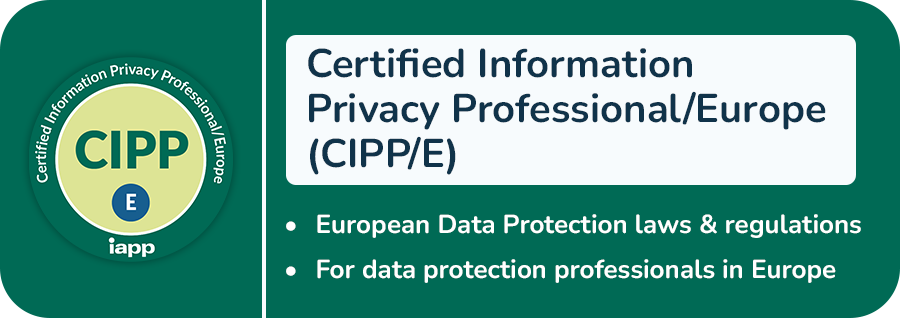
The Certified Information Privacy Professional/Europe (CIPP/E) focuses on European data privacy laws and regulations, specifically the knowledge expected of a Data Protection Officer (DPO) concerning the European legal framework of the legislation. It’s ideal for professionals handling data protection for organizations based in Europe or processing data of EU subjects.
Offered by the IAPP, this exam tests the candidate’s understanding of pan-European and national data protection laws, key privacy terminology, and practical concepts concerning the protection of personal data and trans-border data flows.
The CIPP/E equips IT/legal professionals to fulfill the GDPR's DPO requirements. A DPO’s duties include monitoring compliance, managing internal data protection activities, training data processing staff, conducting internal audits, and more.
The CIPP/E exam domains are the following:
- Introduction to European Data Protection
- European Data Protection Law and Regulation
- Compliance with European Data Protection Law and Regulation
Certified Information Privacy Manager (CIPM)
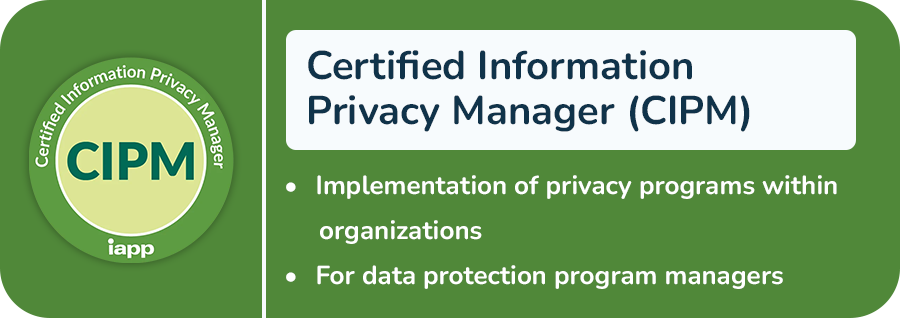
The Certified Information Privacy Manager (CIPM) certification relates to the knowledge a DPO must have concerning the theoretical aspects necessary to lead an organization’s data protection efforts. It’s suitable for professionals who manage data protection initiatives.
Also provided by IAPP, the CIPM exam assesses a candidate’s ability to put a company’s data protection policies into concrete action: create a company vision, structure a data protection team, develop and implement system frameworks, communicate to stakeholders, measure performance, and more.
CIPM exam domains:
- Privacy Program: Developing a Framework
- Privacy Program: Establishing Program Governance
- Privacy Program Operational Life Cycle: Assessing Data
- Privacy Program Operational Life Cycle: Protecting Personal Data
- Privacy Program Operational Life Cycle: Sustaining Program Performance
- Privacy Program Operational Life Cycle: Responding to Requests and Incidents
Certified Information Privacy Technologist (CIPT)
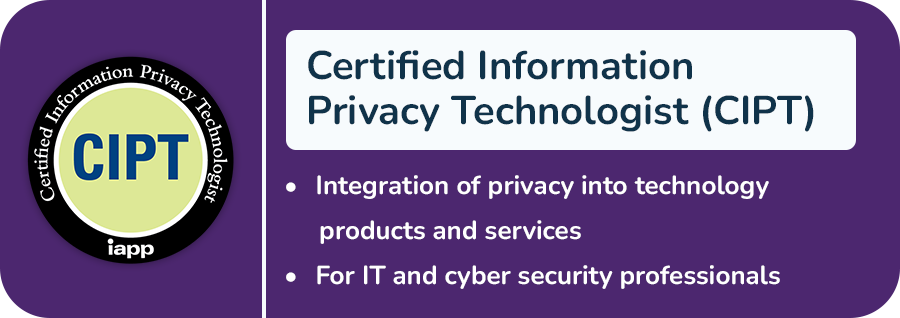
If you’re a tech pro, the Certified Information Privacy Technologist (CIPT) certification may be the right GDPR certification. The previous two certifications may have given you the impression that a legal background is necessary to understand GDPR. However, it’s not.
The target audience of this IAPP certification is professionals integrating privacy into technology products and services, mostly those in IT and cyber security roles. The candidate will acquire strategies, policies, processes, and techniques to manage cybersecurity risks while enabling prudent data use for business purposes.
The CIPT exam domains include:
- Foundational Principles
- The Privacy Technologist’s Role in the Context of the Organization
- Privacy Risks, Threats, and Violations
- Privacy-Enhancing Strategies, Techniques & Technologies
- Privacy by Design
- Privacy Engineering
- Evolving or Emerging Technologies in Privacy
Certified Data Privacy Solutions Engineer (CDPSE)
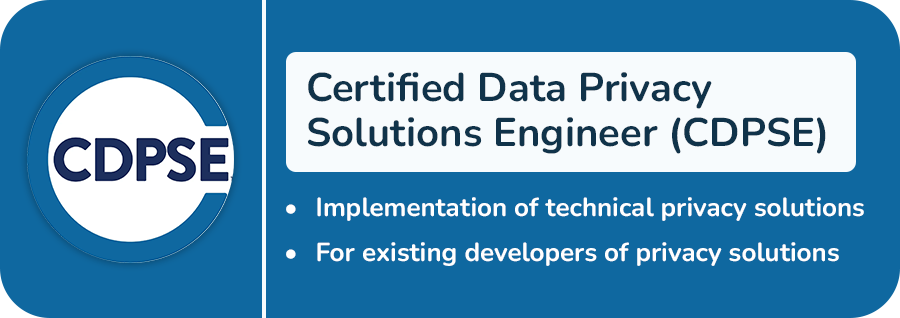
Offered by ISACA, a leading organization that establishes trust in the digital world, the Certified Data Privacy Solutions Engineer (CDPSE) certification concentrates on implementing technical privacy solutions. It’s ideal for professionals already designing and deploying privacy solutions.
The exam alone costs $575 for ISACA members and $760 for non-members. After passing the exam, the CDPSE certification application costs $50. The minimum passing score is 450, with 800 being full marks.
You must have at least three years of cumulative work experience performing the tasks of a CDPSE professional in the ten years before you apply for certification. Candidates can only apply to become CDPSE-certified in the five years following the date they pass the exam.
CDPSE exam domains (% in 2025):
- Privacy Governance (20%)
- Privacy Risk Management and Compliance (18%)
- Data Life Cycle Management (23%)
- Privacy Engineering (39%)
Information Security Courses Bundles
Want lifetime access to expert-led cyber security training? Explore our Information Security Course Bundles — one-time purchase packages covering top topics like Ethical Hacking, Cloud, Linux, DevSecOps, and CompTIA certifications.
ISO/IEC 27701 Lead Implementer
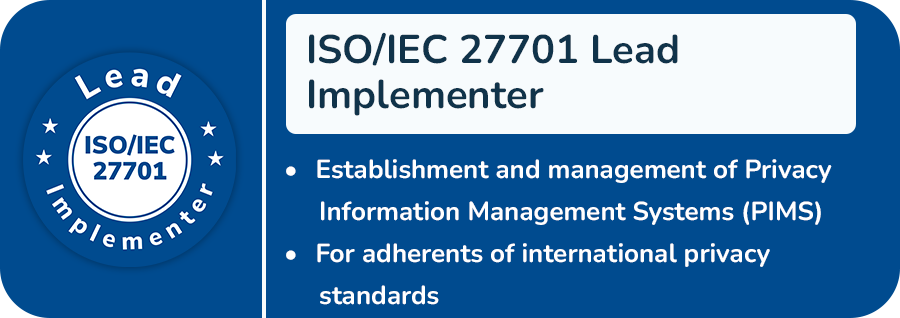
ISO and IEC set international standards that are frequently updated, and ISO/IEC 27701 concerns data protection.
Unlike the previous four GDPR certifications with singular vendors, various accredited bodies offer the ISO/IEC 27701 Lead Implementer certification.
This certification focuses on establishing and managing Privacy Information Management Systems (PIMS), and it’s suitable for any professional aiming to align with international privacy standards in their line of work.
The exam cost varies from $500 to over $1,000 USD, depending on who provides the training and exam packages.
The ISO/IEC 27701 Lead Implementer exam domains (PECB) include:
- Fundamental principles and concepts of a Privacy Information Management System (PIMS)
- Privacy Information Management System controls and best practices
- Planning a PIMS implementation based on ISO/IEC 27701
- Implementing a PIMS based on ISO/IEC 27701
- Performance evaluation, monitoring, and measurement of a PIMS based on ISO/IEC 27701
- Continuous improvement of a PIMS based on ISO/IEC 27701
- Preparing for a PIMS certification audit
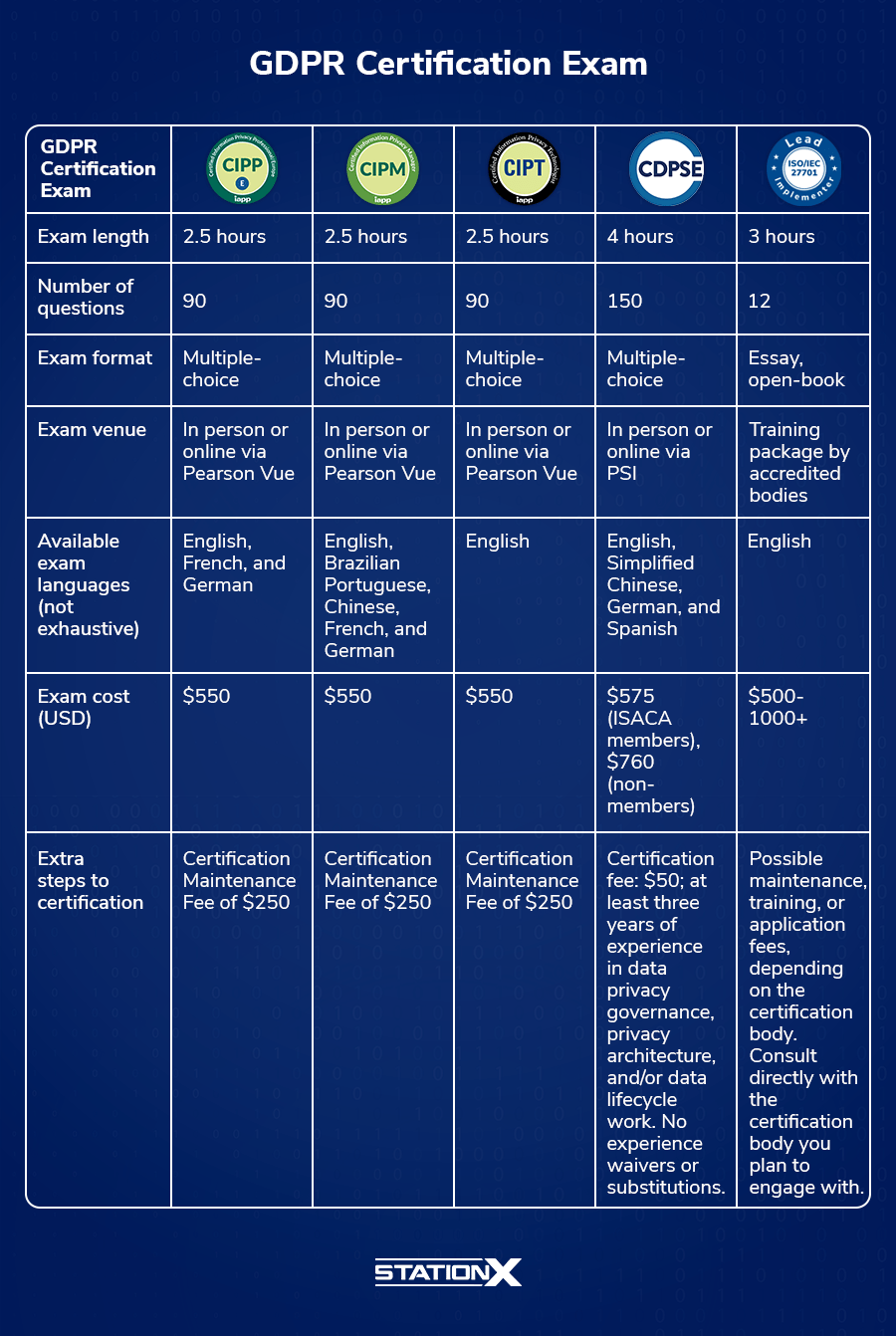
Choosing the Right Certification
According to ZipRecruiter, the average US salary of GDPR-certified professions is $156,593 per year, which is higher than for the three other IT/advisory professions (GRC, Developer, Consultant) shown below.
The higher pay scale means a suitable GDPR certification is worth pursuing.
But with so many GDPR certifications on the market, how do you choose which one’s right for you?
- Assess your current role and career objectives: An IT professional who wants to remain in the industry would do well in GDPR certification exams designed for tech professionals. However, GDPR certifications that focus on the legal and regulatory aspects of the GDPR may be more suitable for lawyers, project managers, consultants, or tech pros who wish to transition to an advisory role.
- Evaluate the relevance of each certification to your professional needs: Study the exam outlines of each certification carefully and think about how it will change the trajectory of your professional life.
- Identify which certifications align with current job market demands: If you’re job-hunting, note which GDPR certifications appear on the open positions you’re interested in and prioritize them accordingly.
- Explore company-sponsored certification opportunities: If your organization subsidizes employees taking professional certification exams, ask your hiring manager whether it can cover the cost of your chosen GDPR certification exam. For example, a paralegal may get reimbursed for getting a CIPM, but a junior full-stack engineer might not.
- Consider factors like certification recognition, cost, and time investment: We’ve handpicked the best GDPR certifications for you. However, they’re all rather demanding exams requiring extensive preparation.
- Reflect on your professional timeline and motivation: Given your schedule, commitments, and willingness to level up, you must ask yourself how much and how urgently you need these certifications for your professional development.
- Recognize the value of strategic certification preparation: Once you understand that a well-recognized, reliable, and suitable GDPR certification gives you an advantage in your career, you can feel confident in preparing for the corresponding exam.
If you’re a legal advisor, project manager, or consultant, you may consider taking CIPP/E or CIPM. If your work experience is predominantly in IT, you may consider a more tech-focused GDPR certification such as CIPT and CDPSE. The ISO/IEC 27701 Lead Implementer doesn’t differentiate among candidates with legal or IT backgrounds.
GDPR Enforcement
In this section, we’ll discuss the scope of GDPR worldwide.
Where is GDPR Used?
The GDPR is in force in the following European countries:
- Austria
- Belgium
- Bulgaria
- Croatia
- Cyprus
- Czech Republic
- Denmark
- Estonia
- Finland
- France
- Germany
- Greece
- Hungary
- Ireland
- Italy
- Latvia
- Lithuania
- Luxembourg
- Malta
- The Netherlands
- Poland
- Portugal
- Romania
- Slovakia
- Slovenia
- Spain
- Sweden
- United Kingdom: the GDPR was enacted before Brexit and is thus a valid UK law.
A non-EU organization must comply with the GDPR if they intentionally offer goods and services to include customers in the EU. As long as you cater to EU customers significantly, you should comply with the GDPR.
The GDPR doesn’t apply to occasional instances, such as an EU subject traveling to Centro Histórico in Mexico City and ordering from a local taco parlor. However, it applies to Amazon book sales because Amazon’s global market segmentation includes EU citizens.
Suppose your organization—knowingly or unknowingly—uses user-monitoring tools to track cookies or the IP addresses of visitors from EU countries. In that case, you also fall under the scope of the GDPR. But given the ubiquity of content management systems with in-built tracking functionalities, it’s unclear to what extent you’d find yourself held accountable by European regulators.
The GDPR’s wide range of applicability and strict wording means organizations processing data of EU residents, regardless of location, must take extra caution to comply with it.
However, the adoption of GDPR by every organization globally isn’t feasible either. That’s why the GDPR makes exceptions to its enforcement, as discussed below.
Where Does GDPR Not Apply?
Jurisdictions outside the scope of GDPR include non-GDPR countries and organizations that don’t involve EU subjects.
The following European countries have not implemented the GDPR:
- Albania
- Belarus
- Bosnia and Herzegovina
- Kosovo
- Moldovia
- Montenegro
- North Macedonia
- Russia
- Serbia
- Turkey
- Ukraine
However, any organization in these countries that collects data in EU member states or the UK is still subject to the GDPR. Moreover, the following data processing activities are exempt from the GDPR:
- Processing data outside the EU
- Data of deceased persons
- Data processing in the personal or household context
- National security and criminal prosecution
- Derogation for special processing activities
- Freedom of expression and information
- Personal data processing for public interest
Here’s an example of Activity #1 where the regulation does not apply:
Your organization is a service provider based outside the EU, such as Hong Kong. It exclusively provides services to customers outside the EU, such as Hong Kong residents. Its clients can use its services when traveling to other countries, including the EU.
Because your organization doesn’t specifically target individuals in the EU, it’s not subject to the GDPR.
Another example, this time of Activity #3:
If you’ve collected email addresses to organize a picnic with work friends, rest assured that you won’t have to encrypt their contact information to comply with the GDPR.
But if you’re collecting email addresses from friends to crowdfund a side business project, such as on Kickstarter, the GDPR may apply to you. The GDPR only applies to organizations engaged in “professional or commercial activity.”
The GDPR also makes an exception for organizations with fewer than 250 employees. Although SMEs aren’t exempt from the GDPR, they’re free from certain record-keeping obligations, as stated in GDPR Article 30.5.
After the GDPR came into effect, a trend known as the “Brussels effect” spread across the globe: many countries began mirroring GDPR principles in their legislation, enacting new data protection laws, and updating existing global data protection practices.
The GDPR differs significantly in scope from earlier and well-known data protection frameworks such as HIPAA and PCI DSS. HIPAA focuses on healthcare organizations and personal health information and mainly applies to US-based organizations. PCI DSS covers every business that stores, processes, or transmits credit cardholder data worldwide.
When you compare the GDPR with newer regional data protection regulations, such as China's or Australia's data protection legal frameworks, you’ll notice that they significantly overlap with the GDPR to ensure compliance regardless of whether the GDPR exemptions apply, minimizing the hefty consequences of non-compliance.
Can GDPR Be Enforced in the US?
The short answer is yes. In this case, the GDPR will apply to US businesses and organizations whose scope of personal data collection includes individuals in the EU.
Multinational corporations (MNCs) are especially subject to the GDPR as clients can come from anywhere globally, including the EU.
However, SMEs whose client base potentially includes EU subjects also fall under the jurisdiction of the GDPR. The GDPR applies to you and your mailing list service provider even if you only have an email newsletter opt-in form on your personal or professional website serving a general audience worldwide.
Here is a checklist of what US companies must do to ensure GDPR compliance:
- Conduct an information audit for EU personal data
- Inform your customers why you’re processing their data
- Assess your data processing activities and improve protection
- Make sure you have a data processing agreement with your vendors
- Appoint a Data Protection Officer (if necessary)
- Designate a representative in the European Union
- Know what to do if there is a data breach
- Comply with cross-border transfer laws (if applicable)
Examples of enforcement actions against US companies include:
| Company | Amount fined (Euros) | Area of non-compliance with GDPR |
|---|---|---|
| Meta | €1.2 billion | Data transfer without adequate data protection mechanisms |
| Amazon | €746 million | Lack of proper consent in targeted advertising |
| €310 million | Undisclosed use of personal data for behavioral analysis and targeted advertising | |
| Uber | €290 million | Inadequate data safeguards |
| Google LLC | €90 million | Making rejecting website cookies more difficult than it is to accept them |
| €60 million | (Same as Google LLC above) | |
| Marriott | €20.45 million | Failure in due diligence post-acquisition leading to a data breach during a cyber attack |
The US government also monitors ongoing lawsuits against US companies for GDPR violations, as exemplified in this September 2019 report.
Therefore, the exorbitant cost of failing to comply with the GDPR necessitates the global talent search for professionals well-versed in the GDPR. You could become the next candidate chosen for an IT advisory role by gaining a well-recognized and reliable GDPR certification.
Conclusion
We’ve covered the top five best GDPR certifications to help you bolster your career in IT or legal advisory roles. The certification you decide to study for depends on your stage, knowledge, career, and professional aspirations.
Not sure how to kick off your GDPR studies? Our StationX Master’s Program has you covered.
At StationX, we’re committed to helping you earn the first GDPR certification that best serves your career goals or your organization’s needs. You’ll also have access to personalized study roadmaps, unlimited career mentorship, our community, a mentorship program, and over 30,000 courses and labs.
Don’t miss out on this opportunity to level up in your career. Here’s a selection of our GDPR courses you’ll access as a StationX Member:
The above Cyber Security Compliance Training Courses can be found here:
- GDPR and Compliance: CIPT, CIPM and CIPP/E Case Studies
- GDPR Training: Data Protection Compliance From Scratch
- ISO 27001 Lead Implementer Training Course
- Start GDPR Course: GDPR Compliance Framework Training
- GDPR Training Online: Foundations & GDPR Certification Guide
- What Is ISO 27001: Get Started With ISO 27001 Training
